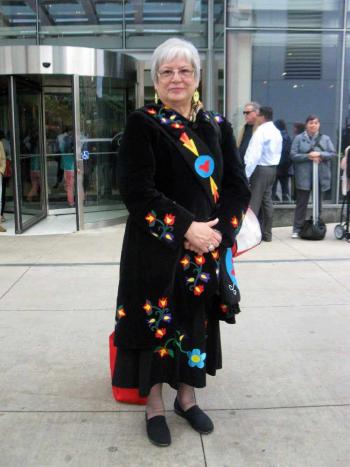Image Caption
By Andrea Smith
Windspeaker.com Contributor
EDMONTON
Marilyn Buffalo, the former president of the Native Women’s Association of Canada, is calling for a reboot of the National Inquiry on Missing and Murdered Indigenous Women and Girls.
The inquiry formally launched last September, but has since been confusing and angering Indigenous people across Canada and has yet to register any major results.
Buffalo has been pushing for a national inquiry since her sister was murdered in 1982, and now, just months after the official inquiry launched, she would rather see the whole thing scrapped and started again.
“Without prejudice, I am finding it very hard to support National Inquiry on Missing and Murdered Indigenous Women and Girls when I am hearing bad news,” she wrote in a statement sent to Windspeaker.com last Saturday.
“…Now Grandmother’s Council, our spiritual leaders, plus five key executive roles are vacant. I think it’s time to re-set the button. Honours of late sisters and girls must be honoured in the proper protocols,” she said.
Buffalo goes on in her statement to say she is saddened by what’s been happening with the inquiry so far, and feels bad for those who are affected by what seems to be poor management. Her feelings of resentment have been growing since the start of the inquiry, and snowballed after hearing of the recent resignation of the executive director of the Inquiry, Michelle Moreau.
What's really getting me is this information comes in dribs and drabs. We’re getting it piece by piece. People are falling and resigning from the national inquiry to the point now the executive director has resigned, the director of Community Relations has resigned, and with the director of Communications… There’s four key positions,” she said.
Buffalo is referring to the recent past resignation of Tanya Kappo from the position of director of Community Relations, which came in early June; And the firing of director of Communications, Michael Hutchinson, which occurred in February, just weeks after leaving the anchor desk at APTN for the position.
It was at what she called a “closed door” meeting last week, that Buffalo heard from her own “very reliable sources” that the Grandmother’s Council will also no longer be a part of the inquiry process, a loss she believes shows just how poorly structured it really is. And a loss she says will only compound the grief that’s already been inflicted upon the families of missing or murdered Indigenous women and girls. We are awaiting a response from the inquiry commission to confirm this information.
“You know, this is no ordinary inquiry to talk about the Canadian economy. This is an inquiry to talk about people who have passed on. Anytime you talk about people who have passed on in a very tragic death, you must follow the protocols within that territory,” said Buffalo.
“So just for this reason alone, and the fact that in addition to that, people are leaving with whatever is going on… they should just have a reset button,” she said.
The national inquiry so far has only held one hearing as part of its Truth Gathering Process. The hearings were held end of May to June 2 in Whitehorse.
Afterward, the inquiry released a statement saying they heard from families of those who were missing or murdered, as well as from members of the public who had something to share. The commission directing the inquiry indicated they had gained a significant amount of information, but it would take some time before they could work that into a something community members and government officials could use.
The entire purpose of the inquiry is to gather information to help people gain insight into the causes and circumstances of MMIW’s, help us all to eradicate the issue, and to give voice to those who have been affected. They have been very specific in noting they are not mandated to carry-out investigations into crimes themselves. (Information available on their website).
The national inquiry o was also taken to task in an open letter from Christi Belcourt in May, which prompted a response in which the commissions cited what they accomplished so far, and what they plan to accomplish in the future.
The response, dated May 19, also acknowledged their failures of communication about what they had been doing, and that the timelines the commission had been given by the government when first started out were “no longer achievable.”
And very recently, on June 27, the inquiry released an “Update by Teams” in which they shared achievements to date from each area: Health, Community Relations, Legal, Communications, Operations, and Research.
One particular hang-up Buffalo believes the inquiry may be experiencing is on the issue of having to go to the Privy Council Office—the party which acts as a go between with an organization working on publicly-funded issues and the Prime Minister—for permission every time they want to take action.
Buffalo is not only a community activist, but has a lengthy career history of working in policy advising and politics, and spear-headed organizations like the Native Women’s Association. She notes it is with experience she speaks on this issue.
“When the TRC was first established, the government hired Justice Harry LaForme. And in his wisdom, he realized just how limited the mandate was. And Claudette Dumont-Smith and the third one (Jane Brewin Morley)… Well they resigned in protest because the mandate was too limited in scope and it wasn’t going to be an independent inquiry,” she said.
“Similarly here, there is no independence. The Privy Council is still in charge. So how then are you going to be able to have independence when the government is controlling it?” she said.

